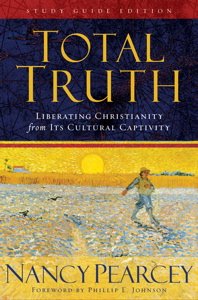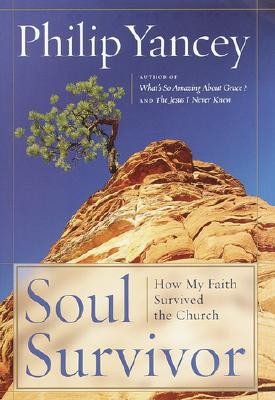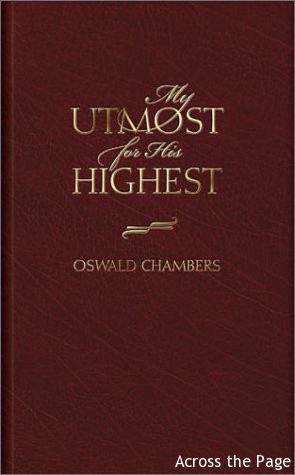Total Truth
 I started Nancy Pearcey’s Total Truth: Liberating Christianity from its Cultural Captivity in 2007. This site contains some information about the book and its author (though the table of contents only gives the first section), and when I was working through the early pages several months ago, I wrote enough about it here to justify its own blog category. In fact, I was getting bogged down and put it aside for awhile, but this week I finished it using the audiobook.
I started Nancy Pearcey’s Total Truth: Liberating Christianity from its Cultural Captivity in 2007. This site contains some information about the book and its author (though the table of contents only gives the first section), and when I was working through the early pages several months ago, I wrote enough about it here to justify its own blog category. In fact, I was getting bogged down and put it aside for awhile, but this week I finished it using the audiobook.
Pearcey is a distinguished academic, a former agnostic who studied Christian worldview under Francis Schaeffer at L’Abri in Switzerland in the 1970’s. I’m a big fan of L’Abri, and though I may feel twinges of envy, I felt no surprise when I found frequent warm tributes to Frances Schaeffer’s thought and his influence in these pages.
Pearcey takes on a huge subject in this book. As its title suggests, the book’s thesis is that instead of shaping culture, Christianity has been shaped by culture, to its detriment. Many Christians end up doing what our culture does, compartmentalizing their faith in a private sphere but living their lives according to the naturalistic notions that underlie thinking in the public sphere. The solution? Develop a true Christian worldview that reflects the adequacy of the Bible to speak to all of life, not just to private religious feelings.
This book is an excellent introduction to doing so. Pearcey leads us through an extensively supported history of ideas, distinguishing Christianity among all the various intellectual currents, and explaining clearly how various cultural influences have shaped it into the insipid creature it is today. She talks at length about how regaining credibility in the public square of ideas depends on being able to engage at the level of worldview — as well as modeling an authentically Christian way of life.
I needed the audiobook to keep me moving all the way through the book, but now that I have the whole picture I’ll need to either go back through it more carefully, or regard it as a reference. There’s simply too much information to absorb in a first reading. (Sometimes I felt overburdened with evidence.) This would be great to study together in a group, and discuss along the way. I would love to have had that opportunity.
My favorite sections were the ones that dealt with the history of evangelicalism, and the feminization of Christianity. I was fascinated by these passages. There was plenty of good discussion of Darwin’s influence in various ways. And I found the discussion of the modern day church/mega-church to be insightful and personally healing. My husband and I left a mega-church last year after 9 years of considering it “home,” and our departure was largely because we felt like it was morphing into a corporation, and using the manipulative, possibly deceptive, anti-intellectual techniques of the commercial world. Souls as widgets. Industrialized religion. What Total Truth gave me was an understanding of the great momentum of history and culture that fuel such a derailing of Christianity in its institutional forms. I come away from the book feeling something less like brittle resentment, and more like compassion. I’m grateful for that.
Total Truth is a hard book to “review.” Its massive substance exerts a gravitational pull toward writing more… and more… and more about it. But for now I’ll just say that I recommend the book to anyone who’s bugged by institutionalized Christianity’s failures to practice what it preaches, and curious to know from whence these failures come. It leaves me tired, but also strangely hopeful.


